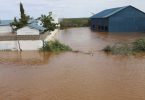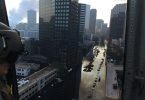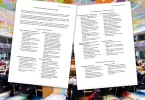It sounds almost like routine. But after a brief two-month lull in creeping fights across the border at the well-known Preah Vihar temple, clashes erupted again yesterday between Thai and Cambodian troops.
A statement from the Thailand Ministry of Foreign Affairs mentions that “around 6:30-7:00 am, Cambodian troops opened fire and launched heavy weapons, including mortars and artillery, without any provocation, into the area of Ta Kwai Temple and along the Thai-Cambodian border towards Ta Muen Temples, situated in Surin Province. The Cambodian troops launched these attacks after a Thai Military Patrol Unit encountered armed Cambodian soldiers constructing bunkers in the area of Ta Kwai temple on Thai territory and informed the Cambodian side that such acts clearly violate Thai sovereignty.” Ta Muen and Ta Kwai (Ta Krabey in Cambodia) temples are located 150 kilometers southwest of Preah Vihear.
According to the ministry statement and despite discussions held between the commanders of both countries, mortar firing and artillery started again from the Cambodian side at 8:30 am. Three Thai soldiers died in the fighting. Between 7,500 and 10,000 civilians were evacuated on the Thai side as a precautionary measure.
This version is rather different from the Cambodian side, with the blame being put on Thailand.
According to a Cambodian newspaper, the Phnom Penh Post, Council of Ministers spokesman Phay Siphan said the fighting broke out after Thai troops fired on their Cambodian counterparts around 6:00 am near Ta Krabey temple, about 15 kilometers from Ta Moan temple in the border province of Oddar Meanchey on the Cambodian side. Preliminary reports said three Cambodian soldiers were killed while 200 families were relocated for safety reasons. “We did not start this fight,” claimed Phay Siphan, “We cannot accept this act.” Further clashes occurred on Saturday with 10 more soldiers killed on both sides of the border. More casualties were also signaled on Sunday morning.
The current clashes are the most violent since a ceasefire was agreed on February 22, following days of fighting around Preah Vihear temple, killing 11 people and wounding dozens of villagers on both sides of the border. After negotiations in Jakarta under the auspices of the Indonesian Minister of Foreign Affairs who chairs this year the ASEAN (Association of South East Asian Nations), it was agreed that unarmed Indonesian military observers would be stationed along the border. However, the agreement has not been implemented.
The situation remains tense between the two kingdoms. So far, UNESCO-listed Preah Vihar temple has been spared from fighting. Talking to the Phnom Penh Post, a major from the Royal Cambodian Army explained that troops were ready at Preah Vihear if necessary.
Although tourism is not affected by this stand-off between both countries, local people along the border areas are likely to suffer as the situation remains unstable.
Tourism Authority of Thailand’s (TAT) Governor Suraphon Svetasreni told eTN a few weeks ago that it would be indeed hard to promote the Southeastern Isaan provinces – even domestically – due to the insecurity in the region.
Meanwhile, development around the Preah Vihear temple – one of Cambodia’s top tourist assets – will probably stay in limbo for a couple more years.
ASEAN is losing a little bit more of its credibility to show a unified face to the rest of the world.






















